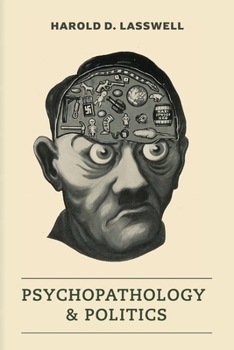Psychopathology and Politics
Select Format
Select Condition 
Book Overview
Psychopathology and Politics by Harold D. Lasswell is a study of personality types as they relate to politicians, business leaders, and church officials. First published in 1930, the work applies the concepts of clinical psychology to the future prediction and prevention of societal and political conflict.
Born in 1902 to a schoolteacher mother and clergyman father, Lasswell was devoted to scholarship and philosophy from a young age. He dedicated his life to studying, teaching, and writing about the intersection of political science, psychology, and sociology.
Lasswell received his Ph.D. from the University of Chicago in 1926. His dissertation, Propaganda Technique in the World War, analyzed the various government "information" campaigns of WWI. This expertise in propaganda would later lead to Lasswell's appointment as Chief of the Experimental Division for the Study of War Time Communications at the Library of Congress during WWII. His role was to review and evaluate Nazi propaganda films to understand how their persuasion methods earned the Nazis the support of the German people.
Upon completing his Ph.D., Lasswell became an Assistant Professor of Political Science at the University of Chicago. Shortly after, he began work on Psychopathology and Politics, the first of over 30 books he would write over the next 45 years.
The book argues that we must have insight into the hidden motivations and impulses of societal leaders in order to channel the desire to lead into healthy expression. Lasswell uses case studies to explore how early experiences inform the opinions that leaders hold later in life. As an example, we follow the preacher "A" through his childhood, youth, and adulthood. We learn about A's intense competition with his brother for their father's affection in childhood. And we're told that this is the cause of A's support for socialism. Looking after one's "brother" is compensation for his own fraternal dislike.
Instead of relying on politicians to resolve conflict, Lasswell argues that it should be the purview of political psychologists to prevent it altogether by "reducing the strain and maladaptation in society." The "politics of prevention," he theorized, would require intense auditing of the effects of politics upon the politicians. For example, "When a judge has been on the bench thirty years, what manner of man has he become? When an agitator has been agitating for thirty years, what has happened to him?"
After WWII, Lasswell became a Professor of Law and Political Science at Yale Law School and served as the President of the American Political Science Association and continued to write dozens of books and hundreds of scholarly articles. In one of these works, he pioneered the "five-questions model of communication." Also known as the Lasswell Communication Model, it requires identifying and analyzing each of the following five questions:
Who (says) What (to) Whom (in) What Channel (with) What Effect
This model is still in use in the studies of communication and public relations.
Lasswell's works are still studied today. After his death in 1978, political scientist Gabriel Almond said that Lasswell "ranked among the half dozen creative innovators in the social sciences in the twentieth century."





